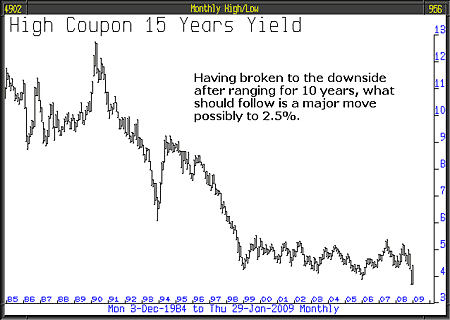Get the latest financial news, insights and expert analysis from our award-winning MoneyWeek team, to help you understand what really matters when it comes to your finances.
You are now subscribed
Your newsletter sign-up was successful
Want to add more newsletters?

Twice daily
MoneyWeek
Get the latest financial news, insights and expert analysis from our award-winning MoneyWeek team, to help you understand what really matters when it comes to your finances.

Four times a week
Look After My Bills
Sign up to our free money-saving newsletter, filled with the latest news and expert advice to help you find the best tips and deals for managing your bills. Start saving today!
It isn't surprising that the Fed has left rates unchanged at the 0 - 0.25% range, the ECB eased by 0.5% to 2% and the Bank of England is expected to ease again when the Monetary Policy Committee next meet. All interest rate roads lead to zero.
Although it is reported that the markets are scared of huge bond issuance, nonetheless, we are not sure that the willingness of governments to create money and borrow endlessly is the whole story because, when all is said and done, it's also about demand. The majority of analysts say that government bonds are a bubble, and well they might be. However, the same people who say that, strangely didn't think the property market was a bubble nor did they think the stock market was a bubble so their bubble-detection skills are flawed.
Logic says that excess issuance is a bad thing; however, the FT recently reported that the demand for long-dated and index-linked UK gilts exceeds supply. That is quite understandable if you think that money on deposit gives you zilch and other asset markets are in sharp decline. Let's just pose this simple question "What will happen to the price of gilts if, as we expect, the UK stock market and other major stock markets move to new lows, as much as 50% below current levels do you think the gilt market will collapse or go higher?" We think it will go a lot higher.
MoneyWeek
Subscribe to MoneyWeek today and get your first six magazine issues absolutely FREE

Sign up to Money Morning
Don't miss the latest investment and personal finances news, market analysis, plus money-saving tips with our free twice-daily newsletter
Don't miss the latest investment and personal finances news, market analysis, plus money-saving tips with our free twice-daily newsletter
The chart for 15-year gilt yields is very interesting. It's quite obvious that in December the price moved below the long-term range, in place since 1999. When prices are frozen in ranges for long periods of time, in this case ten years, the eventual breakout, either above or below that range, is indicative of a new major move, as yet, the move, although quick, is relatively modest. This is where technical analysis comes into its own. On examining the five-year weekly chart, it can be seen that it has rallied back to a key resistance level and the 30-week moving average, that rally is approximately 50% of the move down from the high set in June 2008.
If we are right about the big picture, then this level is a huge investment opportunity to own more long-dated gilts. Even though we lightened up considerably some weeks ago, portfolios remain 10% invested in this sector, we are seriously considering increasing that position dependent upon price action over the next few days.

Everybody's talking about the risk of inflation and unquestionably it could await us down the road; however, the outlook for prices in the economic ice age, a period of austerity and oversupply, is very poor. It may well be that the debasement of currencies by governments at this unique moment in time, the like of which we have never experienced before, will not be inflationary for prices as one would expect, but will very specifically fuel a stellar year for gold.
This article was written by John Robson & Andrew Selsby at Full Circle Asset Management, as published in the threesixty Newsletter on 30 January 2009.
Get the latest financial news, insights and expert analysis from our award-winning MoneyWeek team, to help you understand what really matters when it comes to your finances.
MoneyWeek is written by a team of experienced and award-winning journalists, plus expert columnists. As well as daily digital news and features, MoneyWeek also publishes a weekly magazine, covering investing and personal finance. From share tips, pensions, gold to practical investment tips - we provide a round-up to help you make money and keep it.
-
 Should you buy an active ETF?
Should you buy an active ETF?ETFs are often mischaracterised as passive products, but they can be a convenient way to add active management to your portfolio
-
 Power up your pension before 5 April – easy ways to save before the tax year end
Power up your pension before 5 April – easy ways to save before the tax year endWith the end of the tax year looming, pension savers currently have a window to review and maximise what’s going into their retirement funds – we look at how

